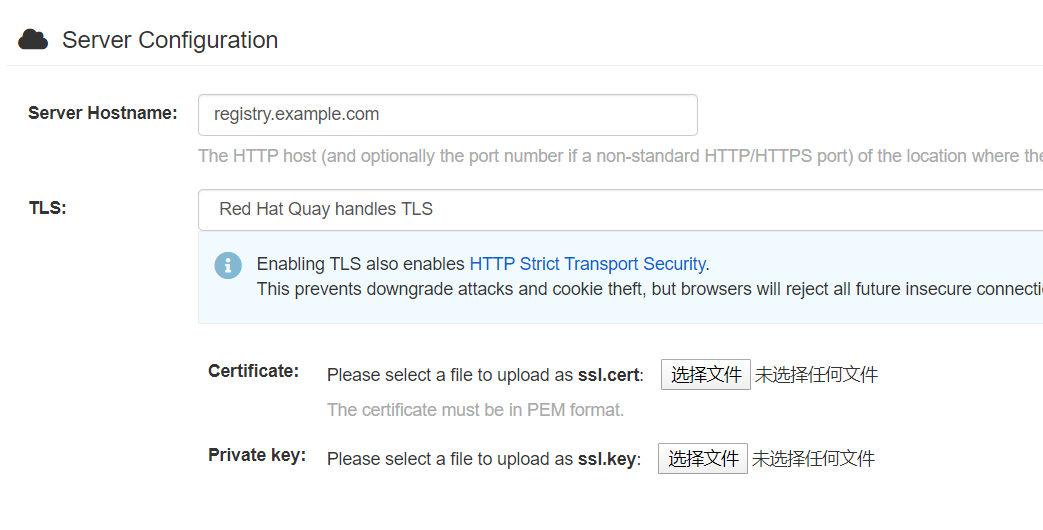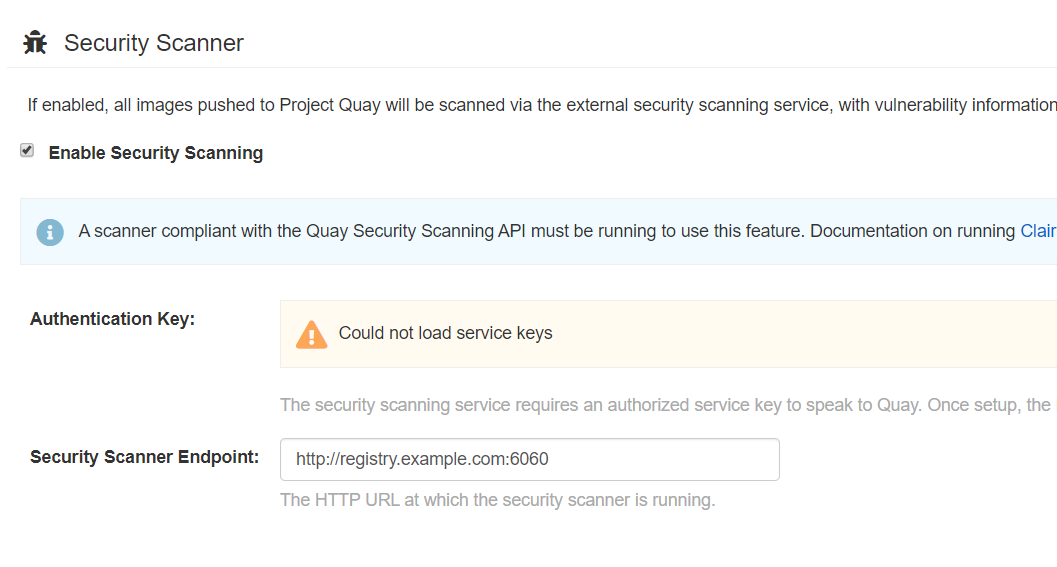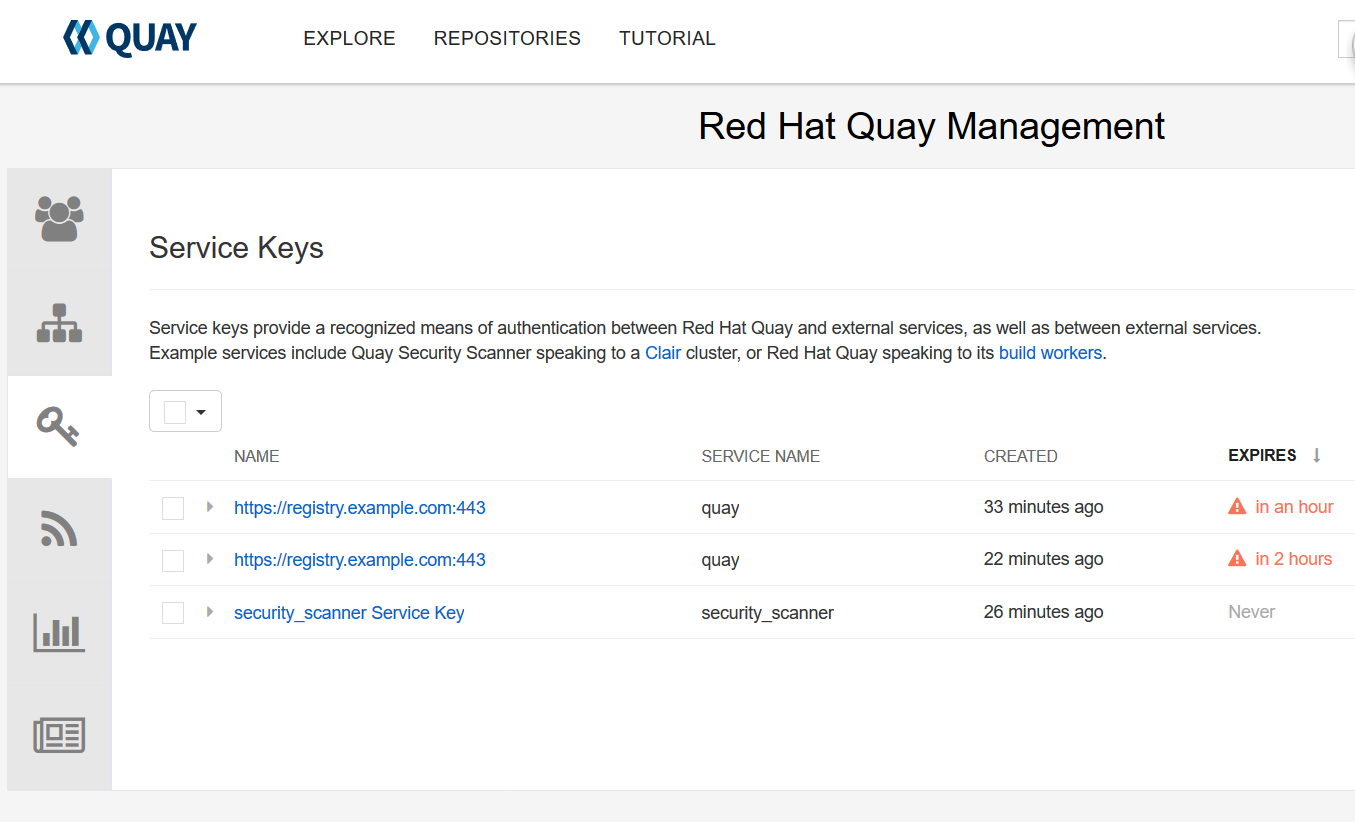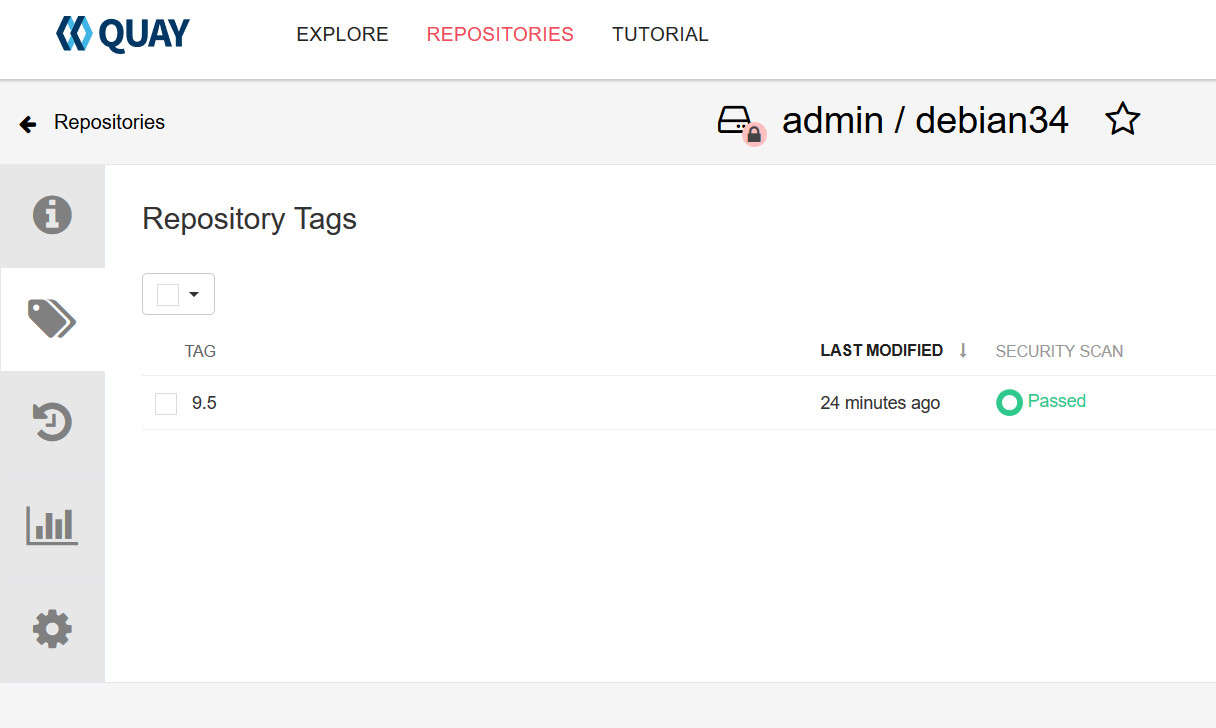版本基于Quay 3.2 ,Clair 3.2
1.搭建DNS named
参考
https://www.cnblogs.com/ericnie/p/12233269.html
2.搭建Quay的基础服务
参考
https://www.cnblogs.com/ericnie/p/12233269.html
这里更新一个地方,在配置的时候,生成SSL的key后直接写在配置界面上。


然后选择security scanner,把key id记录下来,比如
700660d27213683afbeafa8da4af9b53ff933dba4b8614e39c1bd717cf84f72c

直接在/mnt/quay/config下解压文件所得
[root@registry config]# ls
config.yaml extra_ca_certs quay-config.tar.gz ssl.cert ssl.key
启动quay,打开quay的界面转到superuser可以看到key,千万别删除,千万别删除,千万别删除。

注意启动quay以后,需要保证jwtproxy服务启动
[root@f2072855dcac quay-registry]# ps -aux | grep jwtproxy root 196 0.0 0.1 303656 13620 ? Sl 10:14 0:00 /usr/local/bin/jwtproxy --config /quay-registry/conf/jwtproxy_conf.yaml root 552 0.0 0.0 10692 976 ? R+ 10:43 0:00 grep --color=auto jwtproxy
3.配置clair
docker run --name postgres -p 5432:5432 -d postgres sleep 5 docker run --rm --link postgres:postgres postgres sh -c 'echo "create database clairtest" | psql -h "$POSTGRES_PORT_5432_TCP_ADDR" -p "$POSTGRES_PORT_5432_TCP_PORT" -U postgres'
mkdir /clair-config
config.xml
[root@registry config]# cat /clair-config/config.yaml clair: database: type: pgsql options: # A PostgreSQL Connection string pointing to the Clair Postgres database. # Documentation on the format can be found at: http://www.postgresql.org/docs/9.4/static/libpq-connect.html source: postgresql://postgres@192.168.56.107:5432/clairtest?sslmode=disable cachesize: 16384 api: # The port at which Clair will report its health status. For example, if Clair is running at # https://clair.mycompany.com, the health will be reported at # http://clair.mycompany.com:6061/health. healthport: 6061 port: 6062 timeout: 900s # paginationkey can be any random set of characters. *Must be the same across all Clair instances*. paginationkey: "XxoPtCUzrUv4JV5dS+yQ+MdW7yLEJnRMwigVY/bpgtQ=" updater: # interval defines how often Clair will check for updates from its upstream vulnerability databases. interval: 6h notifier: attempts: 3 renotifyinterval: 1h http: # QUAY_ENDPOINT defines the endpoint at which Quay is running. # For example: https://myregistry.mycompany.com endpoint: https://registry.example.com/secscan/notify proxy: http://localhost:6063 jwtproxy: signer_proxy: enabled: true listen_addr: :6063 ca_key_file: /certificates/mitm.key # Generated internally, do not change. ca_crt_file: /certificates/mitm.crt # Generated internally, do not change. signer: issuer: security_scanner expiration_time: 5m max_skew: 1m nonce_length: 32 private_key: type: preshared options: # The ID of the service key generated for Clair. The ID is returned when setting up # the key in [Quay Setup](security-scanning.md) key_id: 700660d27213683afbeafa8da4af9b53ff933dba4b8614e39c1bd717cf84f72c private_key_path: /clair/config/security_scanner.pem verifier_proxies: - enabled: true # The port at which Clair will listen. listen_addr: :6060 # If Clair is to be served via TLS, uncomment these lines. See the "Running Clair under TLS" # section below for more information. # key_file: /clair/config/clair.key # crt_file: /clair/config/clair.crt verifier: # CLAIR_ENDPOINT is the endpoint at which this Clair will be accessible. Note that the port # specified here must match the listen_addr port a few lines above this. # Example: https://myclair.mycompany.com:6060 audience: http://registry.example.com:6060 upstream: http://localhost:6062 key_server: type: keyregistry options: # QUAY_ENDPOINT defines the endpoint at which Quay is running. # Example: https://myregistry.mycompany.com registry: https://registry.example.com/keys/
[root@registry clair-config]# ls
config.yaml security_scanner.pem
启动clair
docker run --restart=always -p 6060:6060 -p 6061:6061 -v /clair-config:/clair/config -v /mnt/quay/config/extra_ca_certs/rootCA.crt:/etc/pki/ca-trust/source/anchors/ca.crt quay.io/redhat/clair-jwt:v3.2.0
4.push镜像,验证
cp rootCA.pem /etc/docker/certs.d/registry.redhat.ren/ca.crt [root@registry ~]# docker push registry.example.com/admin/debian34:9.5 The push refers to a repository [registry.example.com/admin/debian34] f715ed19c28b: Pushed 9.5: digest: sha256:bbb3345ed2e7548dc7a53385b724374ecfb166489a1066cc31b345d0d767df78 size: 529
转到quay界面


关键坑
- DNS
因为无论是quay还是clair启动都会需要根据域名访问对方,所以需要配置dns
需要修改宿主机的/etc/reslov.conf, quay和clair启动中会去读取dns记录
虚拟机重启以后/etc/reslov.conf会修改,记住改回
- Quay和Clair间的Key
这个也比较坑,设置为preshard模式吧。
- Jwtproxy
一开始运行的时候会有此进程,但如果docker restart后这个就没有了。
- Clair的config.yaml
折腾好几天。。。。